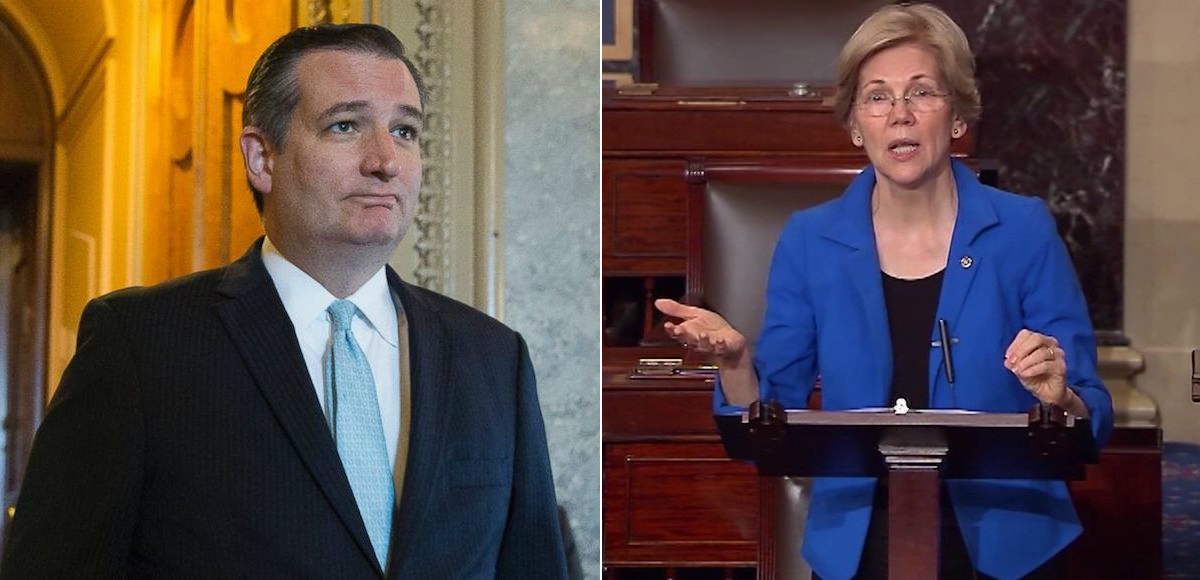

Sens. Ted Cruz, left, R-Texas., and Elizabeth Warren, right, D-Mass., react to the Senate health care bill. (Photos: AP/SS)
Republicans unveiled their Senate health care bill on Thursday and reactions ranged from in-party opposition to predictions Americans would die. The draft, the Better Care Reconciliation Act, will be introduced as an amendment to H.R. 1628, the American Health Care Act (AHCA).
The House passed the AHCA to replace ObamaCare on May 4 after weeks of negotiations and direct presidential involvement. With a slim 52-vote majority and Democrats vowing to obstruct, the GOP can only afford to lose two party line votes on the bill.
But within an hour of the Senate health care bill’s release, four Republican senators came out against it in its current form. Sens. Rand Paul, R-Ky., Ted Cruz, R-Texas, Mike Lee, R-Utah, and Ron Johnson, R-Wis., said they would not vote on the Senate Republican plan in its current form.
“Currently, for a variety of reasons, we are not ready to vote for this bill, but we are open to negotiation and obtaining more information before it is brought to the floor,” the statement said. “There are provisions in this draft that represent an improvement to our current health care system but it does not appear this draft, as written, will accomplish the most important promise that we made to Americans: to repeal ObamaCare and lower their health care costs.”
President Donald J. Trump said it was a good start but that it will be subjected to negotiations as the House bill was for weeks. But the Senate version doesn’t have weeks. Leader McConnell, who along with other congressional leaders met two weeks ago with President Donald J. Trump at the White House to discuss the legislative agenda for the remainder of the year, imposed a July 4 deadline to vote on the bill.
“The current bill does not repeal Obamacare. It does not keep our promises to the American people,” Sen. Paul said in a follow up statement. “I will oppose it coming to the floor in its current form, but I remain open to negotiations.”
Sen. Cruz said the current version of the draft bill doesn’t do “nearly enough” and would be a “disaster politically” for Republicans who have promised to fully repeal ObamaCare for 7 years.
“I have been clear from day one that I want to get to yes,” Sen. Cruz told reporters on Capitol Hill Thursday. “Nobody has fought harder against ObamaCare in the Senate than I have, but we have to actually have legislation that fixes the underlying problem.”
Meanwhile, it was absolute hysteria on the Democratic side of the aisle, returning to their overheated rhetoric before the shooting of House Majority Whip Steve Scalise, R-La., by a leftwing supporter of Bernie Sanders.
“Republicans weren’t making the House bill better, nope,” Sen. Warren said. “They were sitting around the conference room dreaming up new ways to kick dirt in the face of the American people and take away their health care.”
Sen. Elizabeth Warren, D-Mass., said on the floor of the U.S. Senate the GOP is paying for tax cuts in the bill with “blood money.”
“These cuts are blood money. People will die,” she decried. “Senate Republicans are paying for tax cuts for the wealthy with American lives.”
While the House and Senate versions of ObamaCare replacement do eliminate taxes for all Americans, including the wealthy, the Democrats’ signature health care law was the largest tax increase on working Americans in history. The Senate version does repeal most of the taxes associated with ObamaCare, but the so-called Cadillac Tax remains.
House Minority Leader Nancy Pelosi, D-Calif., who is under fire for leading Democrats into one electoral defeat after another, echoed the claim “people will die” and also called it “mean.”
The most damning journalistic sin committed by the media during the era of Russia collusion…
The first ecological study finds mask mandates were not effective at slowing the spread of…
On "What Are the Odds?" Monday, Robert Barnes and Rich Baris note how big tech…
On "What Are the Odds?" Monday, Robert Barnes and Rich Baris discuss why America First…
Personal income fell $1,516.6 billion (7.1%) in February, roughly the consensus forecast, while consumer spending…
Research finds those previously infected by or vaccinated against SARS-CoV-2 are not at risk of…
This website uses cookies.